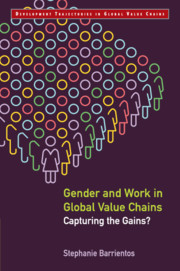Book contents
- Frontmatter
- Dedication
- Contents
- List of Tables
- List of Figures
- List of Abbreviations
- Preface
- 1 Introduction
- 2 Retail Shift and Global Sourcing
- 3 Gender Patterns of Work in Global Retail Value Chains
- 4 Global (re)Production Networks Analysis
- 5 Smallholder (dis)Articulations: The Cocoa–Chocolate Value Chain
- 6 Mixed Outcomes: Downgrading and Upgrading in African Horticulture
- 7 Contested Terrain: The Limits of Social Compliance in Asian Apparel
- 8 Upgrading Strategies: Innovation, Skills and Rights
- 9 Governance Challenges: Promoting Gender-Equitable Value Chains
- 10 Concluding Reflections: Future of Work
- References
- Index
Preface
Published online by Cambridge University Press: 26 April 2019
- Frontmatter
- Dedication
- Contents
- List of Tables
- List of Figures
- List of Abbreviations
- Preface
- 1 Introduction
- 2 Retail Shift and Global Sourcing
- 3 Gender Patterns of Work in Global Retail Value Chains
- 4 Global (re)Production Networks Analysis
- 5 Smallholder (dis)Articulations: The Cocoa–Chocolate Value Chain
- 6 Mixed Outcomes: Downgrading and Upgrading in African Horticulture
- 7 Contested Terrain: The Limits of Social Compliance in Asian Apparel
- 8 Upgrading Strategies: Innovation, Skills and Rights
- 9 Governance Challenges: Promoting Gender-Equitable Value Chains
- 10 Concluding Reflections: Future of Work
- References
- Index
Summary
Books are often the product of a long journey, and this one is no exception. In the 19901990s, much was being made of the ‘Chilean economic miracle’ resulting from trade liberalization implemented under the Pinochet dictatorship. As a postgraduate student of international trade and development with an interest in gender and labour in Chile, I wanted to examine the costs of this ‘miracle’ in the fruit export sector for the large female temporary labour force (las temporeras) employed each season. As part of this research, I undertook focus group discussions with groups of women fruit workers in the lower reaches of the Andes north of Santiago. This encounter dispelled many naïve assumptions I had started out with and highlighted the complexities of globalization for women workers.
Unsurprisingly, I found that, during the fruit season, las temporeras endured exceptionally long hours, with poor pay and few rights. In my discussions with workers, I enquired about their ‘bad’ experiences working in multinational and domestically owned export companies. However, I soon learnt from workers that, despite many problems, the work also provided them with economic independence relative to their previous situation. I met some very forthright temporeras, one of whom forcefully said, ‘We have always worked hard. NOW we are being paid for it.’ They preferred working for multinationals because they offered better pay and conditions than domestically owned companies. From then on, I have been more careful in my research to investigate both the challenges and opportunities for women working in global export production.
This same research also opened my eyes to the changing dynamics of trade, which conventional economics and political economy at the time were not addressing. This came about initially through a misunderstanding. My learnt Castilian was a potential barrier to comprehending the local dialect of workers. A couple of times in one focus group, workers mentioned ‘la visita de tesco’. When I enquired what ‘tesco’ meant, I was met with disbelief and laughter—they were referring to the UK supermarket Tesco. I was amazed that temporary workers in the foothills of the Andes were aware of a UK supermarket located on a different continent.
- Type
- Chapter
- Information
- Gender and Work in Global Value ChainsCapturing the Gains?, pp. xix - xxviPublisher: Cambridge University PressPrint publication year: 2019

